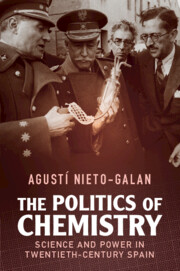‘Scientists were prominent in building Spain’s democratic Republic - two, the chemist José Giral and the physiologist Juan Negrín, became prime ministers. Science under the Franco dictatorship was dominated by one chemist, José María Albareda while another, Manuel Lora-Tamayo, was Minister of Education and Science in the 1960s. This fascinating and totally original work examines the links between chemistry and politics in a way that casts its light far beyond the specifics of Spain.’
Paul Preston - London School of Economics and Political Science
'After taking sides during the Spanish Civil War, chemists either emigrated, endured persecution in Spain, or supported the Franco regime - the latter often selling out their colleagues in the process. Today the Fascist chemists are honored in Spain, but not their victims, an injustice this path-breaking and important book will correct.'
Mark Walker - Union College, New York
‘Anyone interested in the history of chemistry, the relationship between power and science, and the formations of scientific communities and identities would find this carefully researched book an open invitation to follow further research and explore the unresolved topics that the book elucidates.’
Santiago Guzmán Gámez
‘The book provides a rich account of the political dimension of chemistry … the book provides an extraordinary understanding of the role of chemistry and its practitioners in the shaping of science and society in the twentieth century.’
Ignacio Suay-Matallana
‘… Nieto-Galan’s account is very convincing … has not only written an inspiring book on the 'moral ambiguity of chemistry,' but has also contributed significantly to the intersection of science, power, and politics in the twentieth century.’
Anna Catharina Hofmann
Source: Technology and Culture
‘The Politics of Chemistry is a much needed addition to the history of Spanish chemistry, the history of science in the Francoist era, and more generally how scientists behave in authoritarian or totalitarian regimes.’
Peter J. T. Morris
Source: Journal of Modern History





